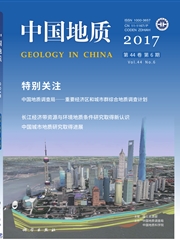

 中文摘要:
中文摘要:
内蒙古宝音图钼矿是狼山北段大型斑岩石英脉型钼矿床,成矿岩体为斜长花岗岩、二长花岗岩、钾长花岗岩及酸性细晶斑岩株组成的复合岩体,LA-ICP-MS U-Pb上交点年龄2400 Ma,反映花岗岩源区岩石是新太古代到古元古代陆壳变质岩。各岩性锆石LA-ICP-MS U-Pb年龄测定显示成矿岩体形成于印支期(225.9±4.4)Ma、(237.5±5.9)Ma、(236.8±4.5)Ma、(244.3±4.2)Ma、(247.5±4.4)Ma和(252.1±3.4)Ma、(258.8±3.3)Ma 4个阶段,同位素年龄反映的每个岩浆侵入阶段持续时间长,各侵入阶段间隔时间短。岩浆侵入期不同阶段元素经历了一定分异,各阶段岩石化学组成均显示铝过饱和,富钾特征,以晚期细晶岩K2O/Na2O最高,K2O对Ca O呈反相关关系。与世界主要岩浆岩带微量元素Sr/Ba-Zr/Y的比较显示,其不同于洋壳熔融成因花岗岩,而与燕山带、秦岭带岩浆岩地球化学特征一致,与矿区元古界变质岩围岩地球化学特征比较接近,这些特征显示本区成矿花岗岩是陆壳岩石熔融成因S型花岗岩。
 英文摘要:
英文摘要:
The Baoyintu molybdenum deposit in Inner Mongolia is a large porphyry quartz vein type molybdenum deposit discovered in the northern part of the Langshan Mountain, and the ore-forming intrusive body consists of plagiogranite, monzogranite, moyite and acidic fine-grained porphyry stock. The LA-ICP-MS U-Pb upper intercepting age is 2400 Ma,suggesting that the granite was derived from late Archean to early Proterozoic crustal rocks. Zircon LA-ICP-MS U-Pb dating shows that the ore-forming intrusive body was formed at four stages in the Indosinia period, i.e., (225.9±4.4) Ma-(237.5±5.9) Ma, (236.8±4.5) Ma-(244.3±4.2) Ma, (247.5±4.4) Ma and (252.1±3.4) Ma-(258.8±3.3) Ma; the isotopic ages imply that each stage of magma intrusion lasted for a long time, and the intervals between various stages of invasion were short. Elements at different stages of magmatic intrusion underwent some differentiation, the chemical composition of various stages of rocks shows oversaturated aluminum, potassium-rich features, with late aplite K20/Na20 being the highest, and K20 and CaO being inversely correlated with each other. A comparison with Sr/Ba-Zr/Y ratios of major magmatic belts in the world shows that it is different from the oceanic crust melt granite, consistent with the Yanshan belt, Qinling belt magmatic rocks, and close to Proterozoic metamorphic country rocks in geochemical characteristics. These features indicate that mineralized granites are genetically continental crust melt S-type granites.
 同期刊论文项目
同期刊论文项目
 同项目期刊论文
同项目期刊论文
 期刊信息
期刊信息
